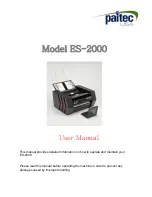
22
Instruction Manual V2.1 – 12/2001
9.
Trouble shooting
Problem
Causes
Remedies
Change place of installation for
the cryostat.
-
Wear mouth protection.
-
Select lower temperature.
-
Wait until knife/blade and/or anti-
roll plate have reached chamber
temperature.
-
Select higher temperature.
-
Remove cause.
-
Select lower temperature.
-
Trim the specimen parallel, in-
crease section thickness.
-
Reposition anti-roll plate.
-
Align correctly.
-
Set correct angle.
-
Use different part of the cutting
edge or replace the knife/blade.
-
Clean with dry cloth or brush.
-
Replace plate.
-
Use different part of the cutting
edge or replace the knife/blade.
-
Readjust correctly.
-
Readjust correctly.
-
Use different part of the cutting
edge or replace the knife/blade.
-
Replace the plate.
-
Cryostat is exposed to air cur-
rents (open windows and doors,
air conditioning).
-
Sliding window was open and
exposed to air currents too long.
-
Frost built up by breathing into the
cryochamber.
-
Specimen not cold enough.
-
Knife/blade and/or anti-roll plate
not yet cold enough and thus
warm the sections.
-
Specimen too cold
-
Static electricity/air currents.
-
Specimen not cold enough.
-
Large area specimen.
-
Anti-roll plate poorly positioned.
-
Anti-roll plate poorly aligned with
cutting edge.
-
Incorrect clearance angle.
-
Cutting edge blunt or damaged.
-
Knife/blade and/or anti-roll
plate dirty.
-
Edge of anti-roll plate damaged.
-
Blunt cutting edge.
-
Anti-roll plate does not protrude
far enough beyond the cutting
edge.
-
Anti-roll plate protrudes too far
beyond the knife edge and is
scraping against the specimen.
-
Cutting edge damaged.
-
Edge of anti-roll plate damaged.
Frost on chamber walls and
microtome
Sections smear
Sections splinter
Sections not properly flattened
Sections not properly flattened
despite correct temperature and
correctly aligned anti-roll plate
Sections curl on the anti-roll plate
Scraping noise during sectioning
and specimen return movement
Ridged sections
Summary of Contents for CM1510
Page 2: ......











































